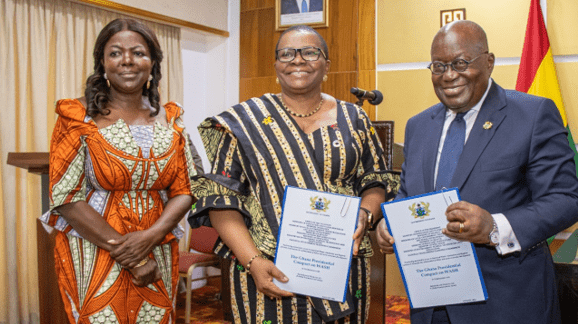By Ewurabena YANYI- AKOFUR
President Nana Addo Dankwa Akufo-Addo signed a Water, Sanitation and Hygiene (WASH) Compact on Wednesday, 28th August, 2024 marking a pivotal and monumental moment for the nation as it stands at a crossroads.
WASH infrastructure, services and behaviors are critical to national development, yet Ghana’s progress in WASH has been lagging behind sectors such as education, health, energy and technology.
For the Ghana WASH Compact to succeed it must not only align with national strategies, there must be political leadership, coordination, regulation and funding.
Overcoming persistent challenges in Ghana’s WASH sector
Ghana made notable progress under the Millennium Development Goals (MDGs) in areas like child mortality and education. However, the WASH sector did not experience the same success (especially sanitation), primarily due to inadequate investment and a lack of strong political leadership.
In this era of Sustainable Development Goals (SDGs), there is renewed global emphasis on sustainability, resilience, regulation and inclusion. SDG 6 (availability and sustainable WASH for everyone by 2030) aims for universal access to safe and affordable drinking water, sanitation, and hygiene by 2030. However, with just six years to go, these goals remain ambitious and may elude Ghana unless collective urgent action is taken.
Despite three decades of strong plans and policies, persistent challenges continue to hamper progress. Ghana is not short of policies, but the bane has been with implementation.
But there is hope as the government also acknowledges that slow implementation, weak governance, limited fiscal decentralization, and poor accountability have stunted WASH advancements. Key obstacles include the low political commitment at the highest levels, insufficient local capacity to deliver services, and a general low levels of public awareness and adherence to WASH laws and regulations.
These systemic issues have had significant consequences for the nation, including lost tax revenue, missed job opportunities for the youth, and billions of dollars in GDP losses. The WASH Compact represents a critical opportunity to refocus efforts, improve coordination among ministries and local authorities, put climate change at the heart of resilient WASH services delivery and address these long-standing challenges.
Climate-Resilient WASH systems and transforming women’s health outcomes
The WASH Compact prioritizes WASH in healthcare delivery, recognizing its critical role in improving women’s health and building climate resilience. This is critical because inadequate WASH services contribute to high maternal and neonatal mortality, particularly in underserved areas. The Compact commits to expanding access to safe water, sanitation, and hygiene in healthcare settings, ensuring that resources are allocated to the most vulnerable populations, including women in rural and peri-urban areas.
In addition to infrastructure improvements, the Compact emphasizes hygiene education and behavior change communication (BCC), targeting healthcare providers and patients to reduce infections and improve health outcomes. This holistic approach, combining infrastructure (“hard”) with education and practices (“soft”), is essential for transforming women’s health outcomes.
WASH as a Climate Issue: No climate resilience without WASH
Undoubtedly, the Ghana WASH Compact emphasizes the essential connection between WASH and climate resilience. As climate change accelerates, causing more frequent floods and droughts, building resilient WASH infrastructure becomes critical to national adaptation efforts.
The Compact strategically integrates climate-resilient WASH systems into Ghana’s National Adaptation Plans, prioritizing sustainable water management and resource reuse through a circular economy approach. This integration ensures that WASH infrastructure not only adapts to changing climate conditions but also plays a role in reducing greenhouse gas emissions, particularly through enhanced sanitation processes that lower methane emissions.
Additionally, the Compact highlights the urgent need to protect surface and underground water sources, watersheds, and basins from the growing threats of illegal mining (galamsey), industrial pollution, and unsustainable farming practices.
By adopting the Strategic Environmental Assessment (SEA) framework, the Compact ensures that environmental sustainability is a core component of all WASH policies, safeguarding water resources for future generations while addressing the environmental degradation caused by these harmful activities.
But the Funding: The big elephant in the room
A major challenge to the Compact’s success is securing consistent and sustainable funding. Ghana continues to rely heavily on donor funding for WASH infrastructure, with Official Development Assistance (ODA) remaining marginal.
To meet SDG 6 by 2030, Ghana must significantly increase both domestic and international funding. The Compact estimates an annual average investment of $1.7 billion from domestic, private sector, and development partner contributions according to the GWASHSDP. For the Compact to succeed, the government must not only boost WASH budgets but also ensure effective and transparent management of these funds, same budgeted same released. The quality of coordination and investment will be critical in transforming these commitments into tangible outcomes.
The role of political leadership
At the heart of the WASH Compact is a call for political leadership. Historically, WASH has been overlooked as a political issue, but the Compact’s placement under the Heads of State Initiative signals a shift in priorities. Ghana’s President is uniquely positioned to mediate among ministries, local authorities, and development partners, ensuring alignment and collective action.
Success will require leadership at all levels—national, regional, and local—driving the WASH agenda. Joint monitoring, mutual accountability, and adaptive learning must be central to the Compact’s implementation.
Ghana as a mentor country
The Ghana WASH Compact offers a significant opportunity for the country to not only tackle its WASH challenges but also position itself as a leader and mentor in Africa.
By aligning national priorities with global sustainability goals, investing in climate-resilient WASH infrastructure, and improving women’s health, Ghana can set the standard for WASH governance in the region.
As a true Pan Africanist, Ghana has done it before and can do it again. To succeed, the WASH sector will need more than political promises. We need to move from commitments to action. Strategic investment, robust monitoring, and a collective commitment to prioritizing WASH are essential.
With the right leadership and funding, Ghana can lead by example in achieving SDG 6 and ensuring a healthier, more resilient future for all. Everyone, everywhere must have access to clean water, safe sanitation and hygiene for all.
The writer is the country director, WaterAid Ghana










